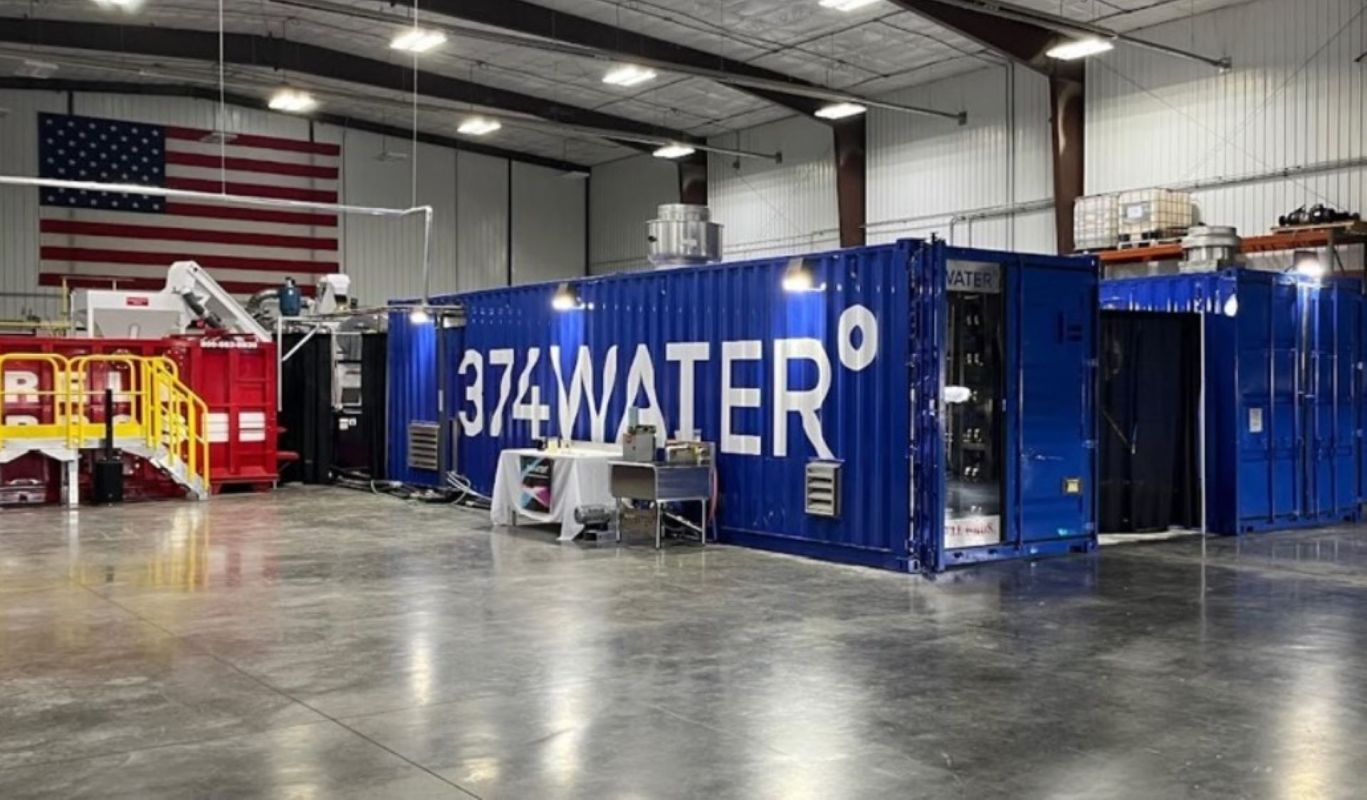It appears that one solution to the problem of plastic waste choking our environment, especially our oceans and waterways, might, ironically enough, be water.
374Water, "a global cleantech, social impact company whose mission is to preserve a clean and healthy environment that sustains life," has developed a genius solution — and it doesn't just apply to plastics.
The company has developed an AirSCWO system utilizing Supercritical Water Oxidation (SCWO), which it describes on its website as "a physical-thermal process powered by water above its critical point (374°C and 221 bar) and air that yields a highly effective oxidation reaction that completely eliminates organic compounds. The reaction generates energy and safe products that can be recovered and reused."
The company's name comes from the temperature at which the process happens — 374 degrees Celsius (705 degrees Fahrenheit) — and 374Water touts itself as the first company in the world to develop an SCWO sanitation treatment system with patented self-sustaining reactor technology.
The company started in 2011 from the Bill & Melinda Gates Foundation's Reinventing the Toilet Challenge, which aimed to develop new technologies that "safely and effectively manage human waste."
Duke University was a recipient, but SCWO was not a widely applicable science at the time. Sudhakar "Sunny" Viswanathan, Vice President of Solutions, explained to The Cool Down that the current CEO, Kobe Nagar, was brought in to execute the work specific to the Gates Foundation, and his work resulted in the system being scaled up commercially.
The company was launched in 2018 by Marc Deshusses, professor of civil and environmental engineering at Duke University, and Nagar.
The SCWO process, which Deshusses affectionately calls a "pressure cooker on steroids," adds heat and pressure to water, taking it to a fourth "supercritical" state. Once in this state, it becomes a dissolvent and will dissolve any organic material. When you introduce air, the oxygen will bond with carbon and remove the carbon from the system. The resulting byproducts are clean water and minerals.
They worked for several years to dial in their AirSCWO system using a 20-foot shipping container behind Duke's campus before striking a deal with Merrell Brothers, the Indiana-based biosolids management company, to manufacture their inaugural systems, which measure 40 feet long, 8 feet wide, and 8 feet tall.
Other companies are also using the SCWO process, as it is one of the only technologies capable of ensuring that "forever chemicals," also known as PFAS, don't live up to their name.
Despite its real-world application and ability to eliminate PFAS and other toxic products — like neurotoxins, pesticides, pharmaceuticals, and microplastics — Viswanathan explained that from Nagar's point of view, there has been some resistance because it's still such an emergent technology. For this reason, Nagar decided to go public, turning it into a system accessible to a bigger market.
374Water currently has three full-scale designs, the smallest of which can handle 6 tons of waste per day. Units will be shipped by the end of 2023 to its first customer: the Orange County Sanitation District, where it will take wastewater and treat and recover it. This will be the first full-scale application of the process.
The National Defense Center for Energy & Environment also awarded the U.S. Navy and 374Water a contract to demonstrate 374Water's SCWO technology at a U.S. Naval installation.
The company recently received the WEF Award for Innovation at the WEFTEC water-quality event, which Viswanathan said provided 374Water with much-needed validation.
374Water's ultimate goal is to scale up the size and ability of its units since, as you scale up the system, it becomes energy-positive. Once in a steady state of operation, the unit uses no dirty energy, and the bigger it gets, it can eventually produce an excess of energy that can be returned to the grid.
"More and more landfills in the U.S. are accepting less and less organic waste, and there is a growing concern about residual compounds like PFAs remaining after traditional treatments," Deshusses said at the ringing of their Nasdaq bell. "These concerns and others have created interest in treatment facilities that can completely eliminate all contaminants on-site. We're excited to show just what our technology is capable of doing."
"The beauty about the AirSCWO process is that it doesn't generate a secondary stream of waste that you have to take care of," Nagar said last year. "It's actually converting all the waste into energy at the backend."
"Twenty-first-century challenges, these require a 21st-century solution," Viswanathan told The Cool Down. "We are in the right place at the right time to be able to do that."
Join our free newsletter for weekly updates on the coolest innovations improving our lives and saving our planet.









